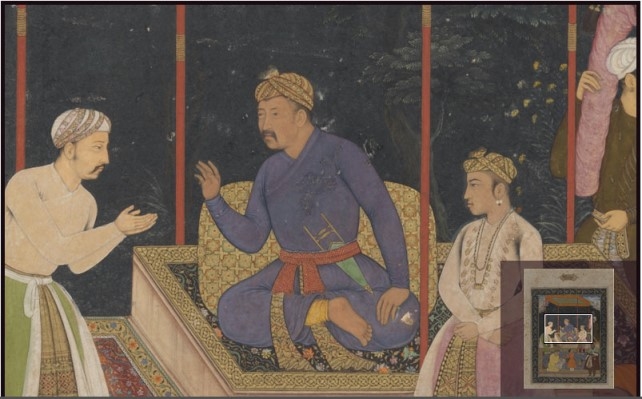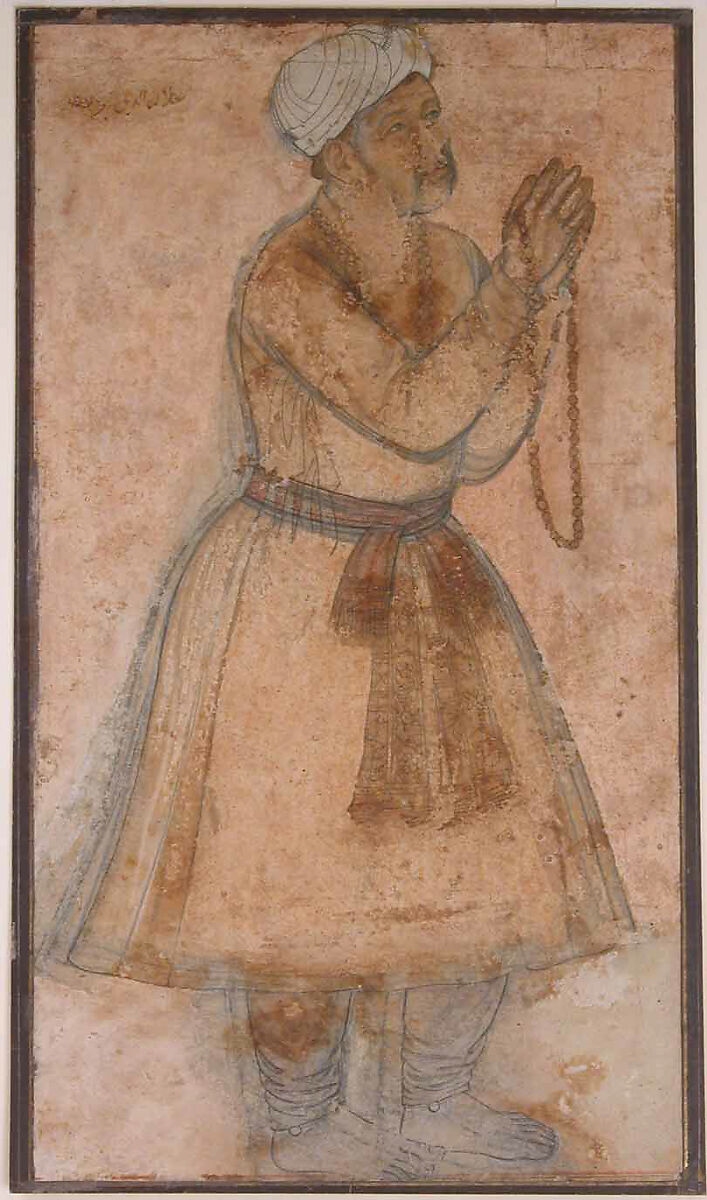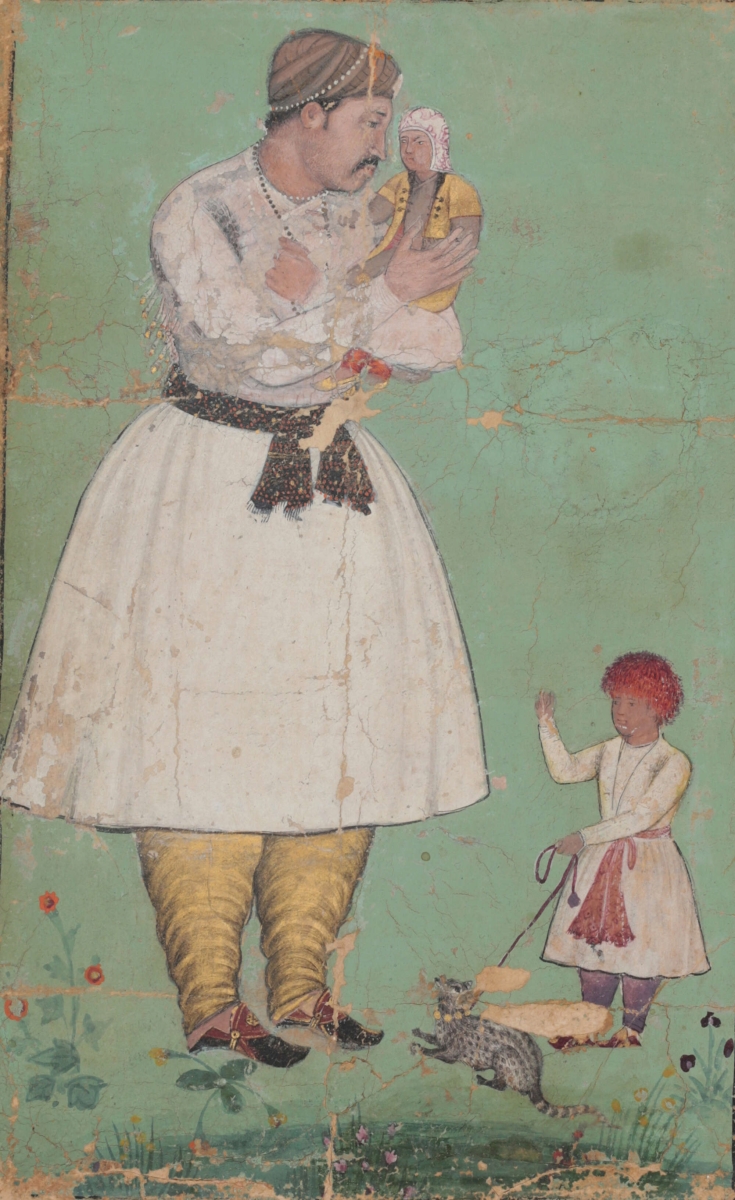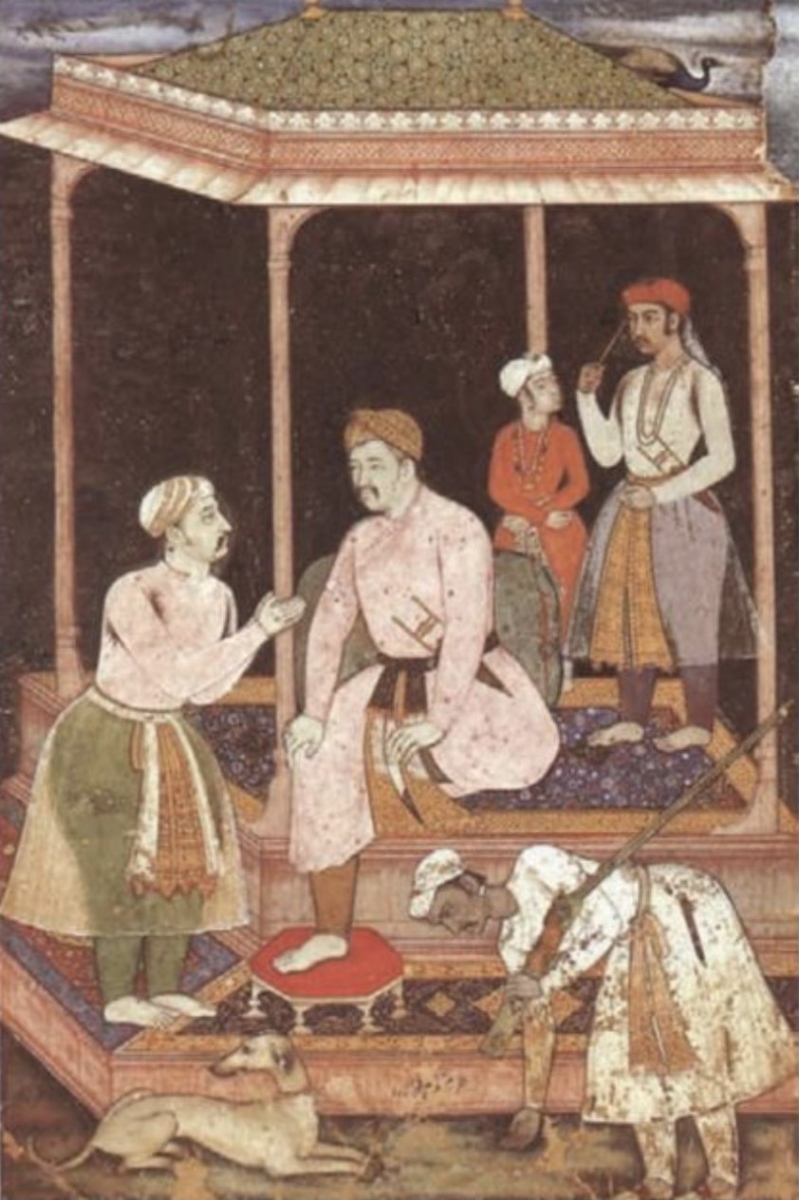Continued, some post-limit on images I think.


Continued, some post-limit on images I think.


Kinda funny with its ajeeb portrayal of the kid, but okay. 


I hope you don't mind if I take part in your discussion 
I have also done some research on Akbar. If you compare pictures from the Akbarnama, Akbar looks more or less the same in all of them, even though they were painted by different artists. I found and read a lot about him on Google. I'm very careful with Wikipedia and also with blogs and other articles. Some of them are very contradictory. That's why I started researching Abul Fazl and Badauni, among others. Badauni was one of his biggest critics and he had no reason to whitewash anything. Abul Fazl, of course, showed his master in the best light.
Akbar was an invader, but he managed to unite. His interest in the different religions and, above all, his tolerance was impressive. We could do with some of that today.
At the time of his accession to the throne, he first had to break away from his ataliq Bairam Khan and also Maham Anga. The "empire" that he had inherited from his father was very unstable, the borders uncertain. With iron rigour, he gained respect and independence. Bairam Khan's revolt laid the foundation for his independence.
You can't compare that time with today. At that time, the law of the jungle prevailed and military campaigns and conquests of other states to expand one's own empire were nothing unusual. Those were rough times. Akbar was not the only one in history to wage cruel wars and destroy the places of worship of other religions. Nor was he the only cruel ruler. It's to his credit that he later became wiser. His court was a court of scribes, painters, poets and musicians. He greatly appreciated art. Even books, even though he couldn't read and write. For me, he is a fascinating personality, apart from the atrocities he undeniably committed.
Hey, thank God and thank you for taking part in this discussion!  You've perfectly said in such few words what I couldn't satisfactorily say in so, so many. I agree completely!
You've perfectly said in such few words what I couldn't satisfactorily say in so, so many. I agree completely! 
The one qualm I have is that I do not believe Akbar can be called an invader. Babur can definitely be called one, but Akbar simply inherited the Empire (although tiny and in tatters) that his forefathers had chosen already. If conquering nearby territories like Gujarat, Malwa etc be called invasion, then everyone from Ashoka to Shivaji would be one.
That aside, I loved your choice of word - 'fascinating' - how true! Let me share something I read yesterday, since you seem interested in this subject like myself 
So I was going through the Akbarnama yesterday, and this one incident caught my fancy. Towards the end of Akbar's life, when there's so much despair, so many deaths... there comes the passing away of Mariam Makani. It's 1604 - possibly the worst year of his life, almost all his old friends are dead, Salim has openly revolted against him, and now the strongest pillar of support he had is gone. No wonder he himself dies just an year later.
On her death, Jalal is absolutely inconsolable, and confines himself to his room. The next day, when he finally emerges, the guards are shocked to see the calmness on his face. The first thing he tells them is, "Tomorrow is Dussehra. Tell the people to do away with their mourning dress."
For me, this line is the most meaningful part of the entire book. It tells one everything they need to know about the man and the Shehenshah! 
Hello. An interesting thread for sure!!! I wouldn't also like to chip in for discussions but again I am not an history student or have that taste to read books related to it  . Still I would like to provide my two cents for sure.
. Still I would like to provide my two cents for sure.
1. For me of all the conquests, Chittor siege has to be the biggest blot in Akbar's life and for Maharana Pratap too. Akbar was cruel, imagine killing someone with slow poison, so that the person doesn't die immediately but with each every passing second. That's what he did. Killed the people slowly for 4 months, stopping their rations and food, so that the royals became desperate at least for their citizens. And after that killing everyone possible, women, children, old aged, handicapped. It was an unbecoming of a person who went to preach religious unity. Moreover, he considered the win as some regilious win, calling it as Jihad!!! I can't ever forget this even if he mended his ways. I guess after that he rarely went for annexations and fights.
2. He seemed to have a heavy reliance on Ameris. I have read somewhere that when he used to go to wars, Ameris used to protect the Haram and Palace. It shows that he used to believe them more than his own relatives. And Man Singh was considered as his Farzand (son), Daniyal was given to Ameris for raising, Bhagwant Das was given important responsibilities.
3. I also find very sad that Mariam Uz Zamani's bane isn't mentioned anywhere in the texts. Her whole family was important for Akbar and yet her name is missing. She seemed to be an influential woman, who used to trade. Even Jahangir also helped her but her real name isn't mentioned. Even Mariam Makani Hamida Banu or Shah Begum's Man Bai name is present but not any solid proof of name of Mariam Uz Zamani.
It amuses me that Shri RamcharitaManas was written during the reign of Akbar.
I'm very interested in this subject 😊 and you're right! Invador is the wrong term. It was late yesterday 😂😂. His father took over the kingdom from his father and Akbar was born in Umarkot in the palace of Rana Prasad, who had given shelter to Humayund and Hamida Begum.
I agree with you. This line is very telling and shows how he changed over the years and gradually adopted Hindu customs. He must have grieved a lot over the death of his mother. She always supported him and surprised him on some of his campaigns or hunts. After her death, he shaved off his hair and moustache for the second time. The first time he did this was on the death of Maham Anga. As you wrote, so many of his 9 Navratnas have already died. He took his mother's body on his shoulders and accompanied him a distance to Delhi. Salim appeared before his father to offer his condolences. Akbar imprisoned him for a few days. And forgave him. But the murder of Abul Fazl still lay between them. The behaviour of his rebellious son, the long-awaited heir, must have hit him hard. Maybe his grief over all this caused him to die.
Perhaps Jalal-ud-din wasn't an invader himself for the sole reason that he was born on Indian Soil but many children of Britishers- who were born in India, for eg, General Dyer himself, responsible for the Jallianwala Bagh was born and brought up in India itself- took up posts in India and went onto continue the British Empire's hold over it.
There is no doubt about this--
Britishers were invaders.
Mughals were invaders.
The Mughal Empire/Rule was forced upon India through conquests and wars and Akbar chose to carry it on, perhaps more kindly than his ancestors and much better than his successors but the fact remains that it was the Mughal Empire.
Just because the Mughals settled in India while the Britishers returned, does not change the core of the fact that India was invaded by both these forces and many others as well.
Many writers of History also claim that the Rajputs too were at one point in time not of India, that they are the descendants of the Huns belonging to some area in China/above the Himalayas.
But the difference is this- the Mughals chose to remain in their religion and spread it whereas the Huns assimilated themselves into the then Caste system, re-forming the Kshatriya caste after it had almost been annihilated by Parshurama.
Could the Huns be seen as Invaders? I don't think so...or at least not more than the Mughals.
Is religion then, the determinant of what is a Invasion and what is not?
Not really, there is also the economic prospect. The changes brought in cultural prospects. The destruction of architecture prospect...all of this has been ticked by the Mughals (Not as much as other invaders perhaps but it's been done).
Agreed, we cannot deny that Akbar's rule was 100% better than many kings but we also cannot forget that Akbar was the exception, not the rule. He was more tolerant than any ruler of the Mughal Dynasty--
And anyway, what even is the definition of Tolerance? Why is this word even used in this context?
Let's see it this way,
A rich family comes and invades a peasant's farmland. Is the rich family tolerant of the peasant or is the Peasant Tolerant of the rich family?
It was NEVER Akbar's job to be 'tolerant', what he did was return some which belonged to the people back to them.
It was the people of Hindustan forced to 'Tolerate' the Mughals and their torture for so long until Akbar came along and they were forced to endure it again once he passed away.
If this notebook definition of 'Tolerance' is the one we are flying with then weren't the Britishers not more 'tolerant' of Indians?
Does your blood not boil to hear the Britishers being called 'Tolerant'? The thing is, The rule of the Brits is fairly recent whereas the Mughal Era came and went long ago and memory (history) is a curious thing.
Bear in mind, the Britishers too did many good things for India. Abolition of Sati pratha, sati remarriage, railway, Education (debatable but okay), they built many ports, many cities were fortified further under them, archaeological excavations were done that showed the greatness of India- Harappa was found in one of these excavations...but we do not forgive the Brits for all the bad they have done, we downright disregard the good that they did.
Then why is it so different for the Mughals?
I think I have a reason...the brits never married Indian Hindu women. Marital alliances played a huge role in making Indians think that the Mughals were Indian too and perhaps at one point they did become Indian but they started out as Invaders and THAT is a fact.
PS. FUN FACT---
If Akbar were born today to a Persian (Iranian) mother and an Afghanistani father, on Indian Soil, he would NOT be considered an Indian Citizen. Actually, he and his parents- all three would be considered Illegal Immigrants if they entered India without a passport (without permission.)
Nah, I don't hate Akbar.
I have only respect for him (If you were to ever ask my mom, she'd say that I am obsessed with him because ever since I watched the show, I have drooled over this man - Rajat Tokas's Akbar)
The real Akbar may have been an OK person but he does seem to have done his duty as King thrice over.
Moreover, not many historical figures are as prominent as Akbar is, even today.
So, only respect.
I am trying to form an opinion on a historical figure and for that, I believe I am in the right place because not everyone is as lucky as I am to have so many brilliant people willing to discuss thoughts without judgement.
Indeed! 'Fascinating' is truly the best word for Akbar as this man is a riddle wrapped in mystery- the more I know the less I seem to figure him out.
Also, great job on the paintings you've found and you're 100% right, this man is very much the same in all these paintings. Very much Mongolian-looking and there is this dagger of his too which is repeated several times, along with a ring of his on the thumb which shows recurring patters, giving credence to both the artist and the muse's truthfulness.
Isn't Ramcharitramanas the part added much later to Ramayana which shows Ram's court accusing Sita, Ram exiling Sita and the mentions of Luv and Kush? |
If that's the case then indeed, it's quite amusing 🤣
comment:
p_commentcount